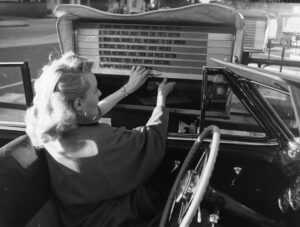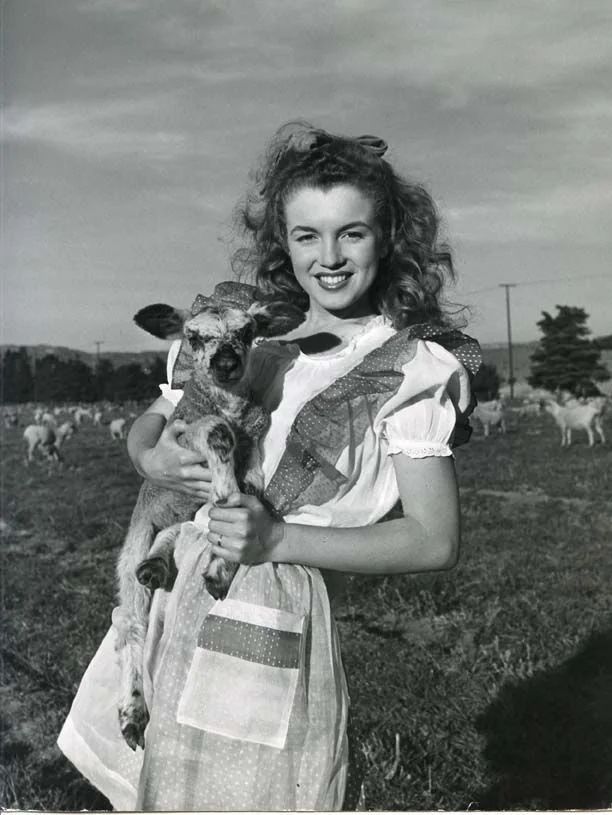
Los Angeles’ car culture was in full bloom after the war, and the innovations that came along with an auto-centric lifestyle were also booming. No other region is more associated with drive-thru, drive-in restaurants and drive-in theaters than Southern California. And while the drive-thru restaurant has endured through the decades, the rest feel like novelties at this point. The “Motormat” is no exception.

“Debuted in 1949, a Los Angeles innovation promised total elimination of carhops. At a new drive-in called “The Track,” it attracted customers from as far as Santa Monica with its unique type of service. Like a group of horses at a trough [there’s a gracious image], cars ringed around a central building, forming a circular pattern. Twenty semicircular parking spaces bridged a center kitchen by means of metal tracks. Food and condiments rode the rails within carrying… compartment[s] each powered by a small ½-horsepower motor.“The mechanical setup was reminiscent of the wackiest Rube Goldberg device. Positioned in a pre-determined [?] parking space, the diner rolled down the car window and was greeted by a stainless-steel bin that could be made flush with the door. Inside the box were plastic cups, a water bottle, menu, order pad, and change tray. It was large, too. Food for six people could be ferried back and forth on the elevated platforms. Patrons would jot down their orders and with the push of a button, the unit scotted a return to the kitchen.Advertisement“When the empty bin arrived at the kitchen, an attendant put through the order and added up the bill. As hamburgers and other entrées were prepared, the rail box made its second journey to the automobile to collect the money. By the time it returned to the preparation area, the food was ready to go–loaded into the compartment along with condiments and the customer’s change. According to inventor Kenneth C. Purdy, the spoke-and-wheel-track arrangement sped service 20-25 percent.”
Despite generating initial excitement, The Track restaurant faced challenges in replacing the traditional carhops on skates. Although it served an impressive number of customers, with 3,000 meals sold on its opening day and nearly 40,000 served in the first two weeks, the Motormat concept never truly gained widespread popularity. The Motormat automated drive-in restaurant branched out to three establishments in the L.A area of 1950, all of them had gone by 1952.

Motormat Memories: A Drive-In Experience in Los Angeles, Where Food Trays Arrived on Rails to Your Car

Motormat Memories: A Drive-In Experience in Los Angeles, Where Food Trays Arrived on Rails to Your Car

Motormat Memories: A Drive-In Experience in Los Angeles, Where Food Trays Arrived on Rails to Your Car

Motormat Memories: A Drive-In Experience in Los Angeles, Where Food Trays Arrived on Rails to Your Car

Motormat Memories: A Drive-In Experience in Los Angeles, Where Food Trays Arrived on Rails to Your Car

Motormat Memories: A Drive-In Experience in Los Angeles, Where Food Trays Arrived on Rails to Your Car

Motormat Memories: A Drive-In Experience in Los Angeles, Where Food Trays Arrived on Rails to Your Car

Motormat Memories: A Drive-In Experience in Los Angeles, Where Food Trays Arrived on Rails to Your Car

